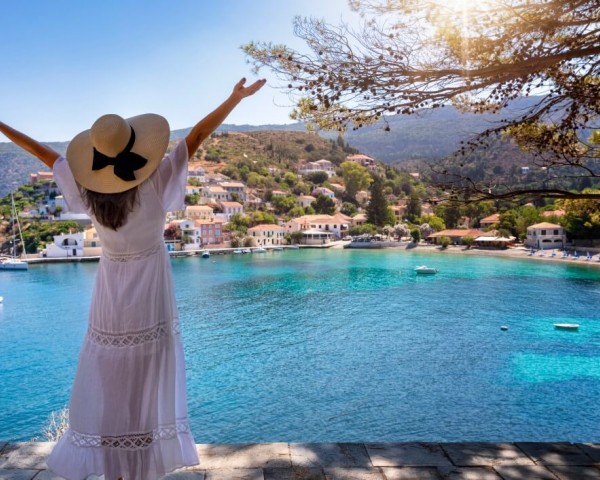Crete versus Mallorca, Capri versus Kos – the islands in the Mediterranean finally want to take off again with tourism. The competition for vacationers who want to escape the Corona frustration is fierce. It is all about the vaccination progress, the dispute over exemptions – and envy.
The competition of the Mediterranean islands is in full swing. Much revolves around the question of who can get its residents vaccinated the fastest. Are Greek destinations like Samos and Naxos ahead, as some in Italy and Spain fear? Where does Mallorca lie in this race?
Greece generally wants to start its summer season on May 15. Italian Tourism Minister Massimo Garavaglia stated June 2 as the target date for the boot. In Spain, there is no official date for the whole country, but Mallorca was already cheering vacation jets at Easter – even if the island was not entirely corona-free.
Italy
“We would be delighted with all our hearts if vacationers from Germany would finally come to us again,” says Capri’s mayor Marino Lembo. “At the moment, it’s all empty. No one is here, not even Italian vacationers.”
The rocky island in the Gulf of Naples, with 14,000 residents in two towns, has recently caused a stir with other Italian islands. Capri announced it could quickly get all its residents vaccinated – rushing past Rome’s vaccination priority for high age groups.
The regional presidents of the two large islands of Sardinia and Sicily – with a combined population of 6.6 million – knocked directly on Prime Minister Mario Draghi’s door. Christian Solinas and Nello Musumeci called for a fast vaccination drive for their islands. They raved about the advantage of good control in ports and airports and suggested “preferential corridors” to vacationers’ countries of origin.
However, the headwind in the country of 60 million inhabitants was enormous. Other vacation areas, such as the Amalfi Coast or mountain regions, became afraid of falling behind. Critics pointed out that Sardinia had only recently crashed out of the top position with the lowest Corona figures nationally. The island of posh resorts for the rich became a red zone. The commonly cited reason: many residents, in their exuberance, had disregarded protective rules such as masks and distance.
In addition, Sardinia and Sicily are among the worst performers in terms of vaccination rates. Some islanders do not want the injections at all.
Rome had clearly rejected the plans. “The Corona Special Commissioner has the issue of tourism in mind, he sees the importance. But at the moment there are no such exemptions,” confirmed a spokesman for Commissioner Paolo Figliuolo. Italy expects to receive more than 50 million vaccine doses in the second quarter, he said. A large part is expected to arrive “starting in May.” Only after that could age priorities change. Mayor Lembo asserts he is heeding the guidelines. Capri could still get to younger age groups earlier, he said. “However, by then, the employees coming from the mainland won’t be through as much.”

Greece
The Greek government has been struggling for a long time to avoid having to write off this year’s vacation season entirely. Prime Minister Kyriakos Mitsotakis was among the first to call for a uniform EU vaccination passport. Even though the season in Hellas is not officially scheduled to start until mid-May, the first planes carrying German tourists landed on the vacation island of Crete as early as the end of March.
Athens has initiated a vaccination campaign specifically for around 70 smaller islands – all residents of Samos, Naxos, Rhodes, Skopelos, Kos and Corfu, for example, have received an offer of vaccination. The islands are to be virtually corona-free by mid-May. Many, though not all, of the inhabitants are having themselves injected – not least because they live from tourism. Crete, with a population of around 630,000, is not one of them.
The dependence on the travel business is also one of the reasons why there is no envy debate about foreign vacationers in Greece. And this despite the fact that Greeks themselves are currently still banned from traveling in their own country because of Corona. On the other hand, since Monday April 19, visitors from abroad are no longer subject to the one-week quarantine they were previously required to undergo when entering the country. Prerequisite: a negative PCR test or a fully completed vaccination.
Spain
In Mallorca, despite the Easter vacationers: Hoteliers, restaurateurs and retailers fear that the Germans’ favorite island could lose out in the competition against Crete, Turkey, Croatia and others. The reason: the left-wing governments in Palma and Madrid do not like to focus on the needs of the tourism industry, neither in their vaccination strategy nor in their relaxation plans.
The entrepreneurs of the Balearic Islands demand that after the vaccination of the risk groups, economic factors are taken into account in the order. Employees in the tourism industry should be given priority, regardless of age. They argue that competitor destinations, for example in Italy, Greece, Croatia and Turkey, would be better supported in vaccinating.
However, the demand for modified vaccination schedules was rejected by the Secretary of State for Health of the central government, Silvia Calzón, during a clinic visit to Mallorca. She spoke of “strict ethical principles.” The vice president of the hoteliers’ association FEHM, María José Aguiló, on the other hand, said, “That’s just an excuse.” She clarified, “No one is asking for an immoral approach, where the more vulnerable are being left out.” All that is wanted, she said, is that those who are exposed to a large number of customer contacts on the job should also be vaccinated quickly.





